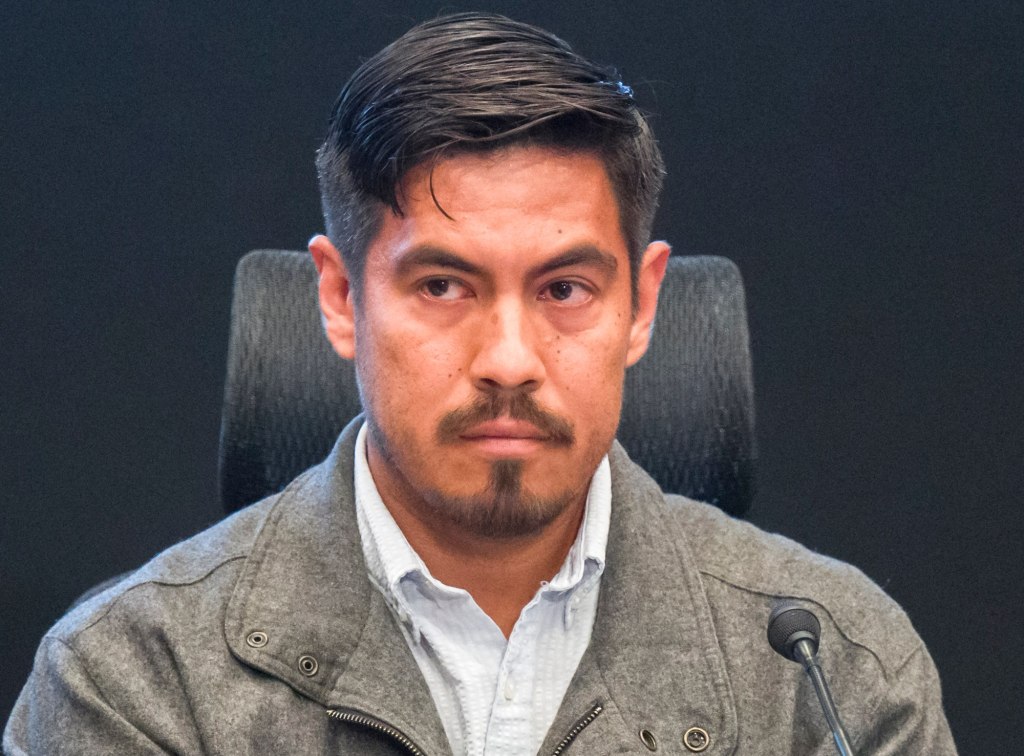Comments by a Santa Ana councilmember known for his vocal criticism of police conduct will be investigated by the city, a majority of his colleagues decided this week, after three Santa Ana Police officers filed complaints over statements that included calling some “killer cops.”
The debate over whether Councilmember Johnathan Hernandez should be formally censured took center stage at Tuesday’s meeting when Mayor Valerie Amezcua and councilmembers Phil Bacerra, Thai Viet Phan and David Penaloza directed city staff to conduct a formal investigation into the complaints.
Councilmembers Benjamin Vasquez and Jessie Lopez were opposed.
A city staff report for Tuesday’s meeting said the City Council had “received complaints alleging that Councilmember Hernandez defamed, harassed and retaliated against certain officers of the Santa Ana Police Department,” and one of those who raised complaints also filed a civil lawsuit in August seeking financial compensation, accusing Hernandez of violating the city charter. Neither the officers’ official complaints nor specific details about the allegations have been made public — a previous closed session when the council discussed the complaints was not open to the public.
“This attempt to silence a dissenting opinion is a violation of my First Amendment right to free speech,” Hernandez said. “I strongly oppose this censure because using a censure in response to public criticism risks undermining free speech and the ability of elected officials to advocate for their constituents.”
City Attorney Sonia Carvalho outlined the censure process as an official condemnation or expression of disapproval. Acts such as improper interactions with city employees or the illegal disclosure of closed-session information in violation of the Brown Act would be grounds for censure, she said. A censure could result in restrictions such as removal from committees, loss of travel funds, or limited staff access.
Hernandez recused himself from Tuesday’s discussion, instead leaving the dais and addressing the council during the public comment portion of the meeting. He wore a shirt with “Arrest the cops who killed Brandon Lopez,” a reference to his cousin.
Hernandez has been critical of police in the past over his cousin’s death. Lopez was shot and killed in Santa Ana by Anaheim police officers during an hours-long standoff in 2021 following a pursuit. Hernandez, who witnessed the shooting, had arrived with other family members to the scene and identified himself to police as a mental health professional. He accused police of ignoring information he offered about his cousin’s mental state, after Hernandez said he told them his cousin was mentally ill and suicidal.
Several residents spoke in support of Hernandez, urging transparency regarding the complaints. A few characterized the move as censorship or retaliation.
“Before you move forward with any kind of censure, the public deserves full transparency. What exactly are the allegations? Who’s behind them?” asked one public comment speaker, Aliyah Nunez. “Who’s the next person that’ll be silenced for asking the hard questions or standing up to power? This is how corruption grows — not from outsiders, but from within.”
Another speaker, a woman from Ward 4 who identified herself as Sue, said Hernandez should recuse himself from voting on police matters because of his “personal issues” with the department. “Whatever is inside of you that makes you feel so much hatred toward our police — I don’t understand it,” she said.
Carvalho described the censure process as “a form of self-policing,” adding that while censure does not remove an elected official from office, it publicly states that certain behavior is unacceptable to other councilmembers.
Amezcua said the issue was not about Hernandez personally. She argued that his comments could be used in a lawsuit against the city and warned of “vile words that will cost us as a city millions of dollars if it goes to court.”
But, Hernandez said “using a censure in response to public criticism risks undermining free speech and the ability of elected officials to advocate for their constituents,” he said. “In censuring me, you are also censuring my neighbors and my constituents — your residents.”
A report with the investigation’s findings will be presented to the council in January.

